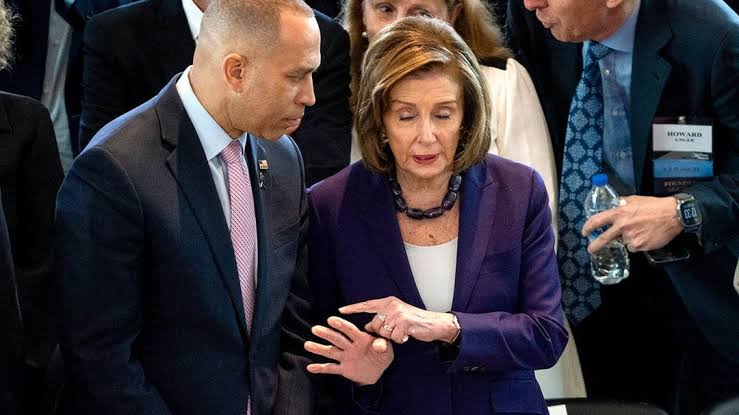
Former Speaker Nancy Pelosi (D-Calif.) has fanned the flames of the internal Democratic battle over Israeli Prime Minister Benjamin Netanyahu’s coming speech to Congress, questioning the wisdom of the invitation just days after it was endorsed by Democratic leaders in both chambers.
Pelosi’s comments — and her decision to air them on national television — have struck a nerve with some rank-and-file Democrats, who are voicing concerns that she’s made it only more difficult for her successor, House Minority Leader Hakeem Jeffries (D-N.Y.), to steer the caucus through a stormy debate on a hot topic that’s divided the party with increasing intensity amid Israel’s war with Hamas.
“I was disappointed because I think it does make things more difficult for our leadership,” Rep. Juan Vargas (D-Calif.) said. “They made a decision, the decision was a tough one, and we usually hang together. Honestly, when she was Speaker, we hung with her, and I was hoping she would do the same.”
Rep. Stephen F. Lynch (D-Mass.), who is leaning toward boycotting Netanyahu’s speech to protest his handling of the war, nonetheless supports the decision by Democratic leaders to invite the prime minister to Washington. He’s echoing Vargas’s warning that Pelosi’s comments will only exacerbate the party’s differences over Israel to the benefit of Republicans.
“Israel is an ally, and many of us support Israel without supporting Netanyahu. And I think that’s the basis upon which Mr. Jeffries made his decision. This was a courtesy to an ally, and not anything more,” he said. “Obviously, she’s the former Speaker of the House, and I think comments like that are not helpful to the cohesion of the party.”
Democrats are jousting over Israel’s military response to Hamas’s attacks last October, which led to the death of roughly 1,200 people and the kidnapping of 250 more. In the eight months since then, more than 35,000 Palestinians have been killed by Israeli strikes, infuriating liberal Democrats who have accused Netanyahu of doing far too little to avoid civilian casualties. Some consider him a war criminal.
Republicans, by contrast, are virtually united over the war, backing Netanyahu’s aggressive show of force and urging Israel not to stop until Hamas is eliminated. To promote that message, Speaker Mike Johnson (R-La.) in March drafted an invitation for Netanyahu to address a joint meeting of Congress — a move derived, at least in part, from Senate Majority Leader Chuck Schumer’s (D-N.Y.) explosive floor speech days earlier bashing Netanyahu’s leadership and calling for new elections in Israel to replace him.
After consulting with the White House, both Jeffries and Schumer endorsed the letter earlier this month.
“We made the decision that we were going to take the same approach that we’ve taken with other heads of state,” Jeffries said last week.
Pelosi disagrees, and in an appearance on CNN earlier in the month, she said plainly that the decision to invite Netanyahu was “wrong,” warning that it would only fuel the already heightened domestic unrest surrounding the Israel-Palestine conflict.
“I feel very sad that he has been invited,” she told the network.
The liberal Pelosi, who led the Democrats for most of this century, has a long history of clashing with the conservative Netanyahu, Israel’s longest serving prime minister — a feud that reached a previous height in 2015, when Netanyahu last addressed lawmakers on Capitol Hill. That invitation came from then-Speaker John Boehner (R-Ohio), who sidestepped President Obama and Democratic leaders to bring the Israeli leader to the Capitol — an episode she still resents.
“He came and he criticized Obama on the Iran nuclear deal,” she said last week. “It was awful.”
Even in light of that acrimonious history, Pelosi’s recent remarks to CNN made waves.
On the left, the comments energized some liberals, especially the most vocal Netanyahu critics who are planning to boycott his speech next month. Those lawmakers are cheering her pronouncement, saying it gives voice and gravitas to sentiments held by a large faction of the caucus. Also, they add, it was no accident.
“Nancy Pelosi is very strategic in everything that she does, and she’s also very discreet in everything that she does,” said Rep. Hank Johnson (D-Ga.), who is boycotting the speech. “And so for her to come forward, I think she’s expressing what a lot of members feel. And she is giving cover to members who might be in tight positions who feel the way that she does.”
Rep. John B. Larson (D-Conn.), a former head of the Democratic caucus, expanded on that argument, saying Pelosi was “sending several different messages” to several different audiences. They include liberal lawmakers, but also liberal voters infuriated over the soaring number of Palestinian deaths, as well as her allies in the White House who have been rebuffed by Netanyahu throughout the war in Gaza.
“She’s expressing the sentiment of a number of voters and a number of members,” said Larson, who plans to attend the address. “And she’s especially upset with the way he’s treated Biden and [Secretary of State Antony] Blinken.”
Other Democrats, however, are warning that anything less than a strong show of support for Netanyahu’s visit undermines the chances that Hamas will be defeated, the hostages rescued and a peaceful resolution achieved.
Rep. Brad Schneider (D-Ill.) declined to comment specifically on Pelosi’s comments. “But,” he quickly added, “if I were the leader I would have signed the letter.”
“He’s the prime minister of one of our closest allies,” Schneider said. “This is a very complex issue with a lot of nuance, and lots of people are trying to suppress the nuance to create political advantage for their position or their side.
“It does none of us any good to divide Congress, divide either party, in support for a key ally.”
Pelosi, for her part, is making no apologies, amplifying her opposition to Netanyahu’s address in a brief interview last week.
“I think that it’s going to be very provocative, and he shouldn’t be invited,” she said. “I don’t know what he’s going to say, but it’s going to provoke protesters anyways.”
Pelosi made a point not to criticize either Jeffries or Schumer, with whom she speaks frequently and has close ties, saying they had little choice but to endorse the invitation once Johnson had drafted it. She also rejected the idea that she might have undermined their decision to join the invitation, or complicated their efforts to tamp down internal discord heading into the visit.
“No, no, we have a freedom of speech here,” she said. “And I said on CNN, I said I don’t agree, but I respect that they made their own decision.”
Jeffries is also downplaying the episode, saying he’s not concerned it will highlight internal divisions over Israel.
“She certainly has the ability to speak on behalf of herself, and House Democrats will respect her perspective,” he said. “But our view is that members will make a decision one way or the other based on their own individual feelings relative to this particular visit, similar to every other visit.”
Rep. Gregory Meeks (N.Y.), senior Democrat on the House Foreign Affairs Committee, also dismissed the clashing approaches to Netanyahu’s visit, saying Pelosi was simply asked a question on TV and “she just answered it honestly.”
“Hakeem is not Nancy Pelosi, Nancy Pelosi is not Hakeem — their styles are different,” he said.
“There’s nothing wrong with that.”



